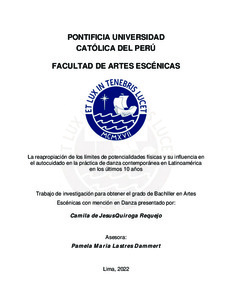| dc.contributor.advisor | Lastres Dammert, Pamela Maria | |
| dc.contributor.author | Quiroga Requejo, Camila de Jesus | |
| dc.date.accessioned | 2023-10-27T20:48:12Z | |
| dc.date.available | 2023-10-27T20:48:12Z | |
| dc.date.created | 2022 | |
| dc.date.issued | 2023-10-27 | |
| dc.identifier.uri | http://hdl.handle.net/20.500.12404/26261 | |
| dc.description.abstract | La investigación presenta un enfoque ético acerca de la reapropiación de las limitaciones de
posibilidades físicas que los bailarines suelen experimentar en sus cuerpos durante la práctica de
danza contemporánea y como la influencia de esta acción, es decir, de reapropiación, influye en el
autocuidado de cada bailarín desde el reconocimiento como seres humanos, pese la perspectiva
profesional de la que se toma en cuenta en la investigación.
Durante la investigación se reveló una posible respuesta sobre la influencia de la reapropiación
corporal en el autocuidado, validando la intención de este trabajo. Lo que nos lleva a que la
importancia radica en el reconocimiento y aceptación de un cuerpo vulnerable y diferente, llenos
de información y estímulos debido a la carga social. Además, se destaca que el reconocimiento de
vulnerabilidad y el desarrollo de enfrentamiento a la carga social permite el empoderamiento del
bailarín con respecto a su cuerpo en la práctica de danza, lo que hace que se priorice el bienestar
propio, pero sin desvincular el lado colectivo ya que, desde la ética, se utiliza el concepto sobre el
autocuidado como un bienestar colectivo. Además, se presentó que es la apertura de la práctica y
la técnica de danza contemporánea, la que permite el vínculo con el bienestar y sus caminos para
reforzar la confianza y la integración a nuevas herramientas de movimiento, lo cual hace posible
la reapropiación corporal y la posibilidad de estar bien emocional y físicamente. | es_ES |
| dc.description.abstract | In the present work, a research approach is proposed on the reappropriation of the limitations of
physical possibilities that dancers usually experience or recognize in their bodies during the
practice of contemporary dance and also how the influence of this action influences, that is, of the
reappropriation. the self-care of each dancer from the recognition as a human being, despite the
professional perspective that is taken into account in the research.
During the investigation, a possible answer on the influence of body reappropriation on self-care
was revealed, validating the intention of this work. Which leads us to the fact that the importance
lies in the recognition and acceptance of a vulnerable and different body, full of information and
stimuli due to the social burden. In addition, it is highlighted that the recognition of vulnerability
and the development of the confrontation with the social burden allows the empowerment of the
dancer with respect to her body in the practice of dance, which prioritizes her own well-being, but
without disassociating herself from the collective side. since, from ethics, the concept of self-care
is used as a collective well-being. In addition, it was presented that it is the opening of the practice
and technique of contemporary dance, which allows the link with well-being and its paths of trust
and integration to new movement tools, which enables the reappropriation of the body and the
possibility of being well emotionally and physically | es_ES |
| dc.language.iso | spa | es_ES |
| dc.publisher | Pontificia Universidad Católica del Perú | es_ES |
| dc.rights | info:eu-repo/semantics/openAccess | es_ES |
| dc.rights.uri | http://creativecommons.org/licenses/by/2.5/pe/ | * |
| dc.subject | Danza moderna--América Latina | es_ES |
| dc.subject | Danza moderna--América Latina--Estudio y enseñanza | es_ES |
| dc.subject | Danza moderna--América Latina--Aspectos fisiológicos | es_ES |
| dc.title | La reapropiación de los límites de potencialidades físicas y su influencia en el autocuidado en la práctica de danza contemporánea en Latinoamérica en los últimos 10 años | es_ES |
| dc.type | info:eu-repo/semantics/bachelorThesis | es_ES |
| thesis.degree.name | Bachiller en Artes Escénicas con mención en Danza | es_ES |
| thesis.degree.level | Bachillerato | es_ES |
| thesis.degree.grantor | Pontificia Universidad Católica del Perú. Facultad de Artes Escénicas | es_ES |
| thesis.degree.discipline | Artes Escénicas con mención en Danza | es_ES |
| renati.advisor.dni | 09340768 | |
| renati.advisor.orcid | https://orcid.org/0000-0001-8221-2071 | es_ES |
| renati.author.dni | 70109309 | |
| renati.discipline | 215106 | es_ES |
| renati.level | https://purl.org/pe-repo/renati/level#bachiller | es_ES |
| renati.type | https://purl.org/pe-repo/renati/type#trabajoDeInvestigacion | es_ES |
| dc.publisher.country | PE | es_ES |
| dc.subject.ocde | https://purl.org/pe-repo/ocde/ford#6.04.01 | es_ES |






